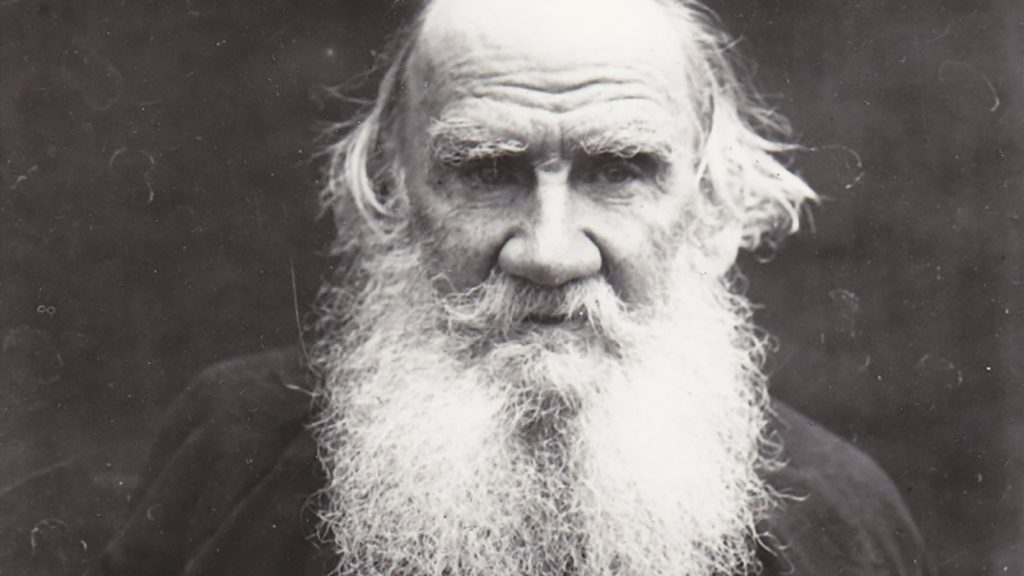
War and Peace, Anna Karenina, The Death of Ivan Ilyich —many of us have felt the influence, to the good or the ill of our own reading and writing, of Leo Tolstoy. But whose influence did Leo Tolstoy feel the most? As luck would have it, we can give you chapter and verse on this, since the novelist drew up just such a list in 1891, which would have put him at age 63.
A Russian publisher had asked 2,000 professors, scholars, artists, and men of letters, public figures, and other luminaries to name the books important to them, and Tolstoy responded with this list divided into five ages of man, with their actual degree of influence (“enormous,” “v. great,” or merely “great”) noted.
It comes as something of a rarity, up to now only available transcribed in a post at Northampton, Massachusetts’ Valley Advocate:
WORKS WHICH MADE AN IMPRESSION
Childhood to the age of 14 or so
The story of Joseph from the Bible — Enormous
Tales from The Thousand and One Nights: the 40 Thieves, Prince Qam-al-Zaman — Great
The Little Black Hen by Pogorelsky - V. great
Russian byliny: Dobrynya Nikitich, Ilya Muromets, Alyosha Popovich. Folk Tales — Enormous
Puskin’s poems: Napoleon — Great
Age 14 to 20
Matthew’s Gospel: Sermon on the Mount — Enormous
Sterne’s Sentimental Journey — V. great
Rousseau Confessions — Enormous
Emile — Enormous
Nouvelle Héloise — V. great
Pushkin’s Yevgeny Onegin — V. great
Schiller’s Die Räuber — V. great
Gogol’s Overcoat, The Two Ivans, Nevsky Prospect — Great
“Viy” [a story by Gogol] — Enormous
Dead Souls — V. great
Turgenev’s A Sportsman’s Sketches — V. great
Druzhinin’s Polinka Sachs — V. great
Grigorovich’s The Hapless Anton — V. great
Dickens’ David Copperfield — Enormous
Lermontov’s A Hero for our Time, Taman — V. great
Prescott’s Conquest of Mexico — Great
Age 20 to 35
Goethe. Hermann and Dorothea — V. great
Victor Hugo. Notre Dame de Paris — V. great
Tyutchev’s poems — Great
Koltsov’s poems — Great
The Odyssey and The Iliad (read in Russian) — Great
Fet’s poems — Great
Plato’s Phaedo and Symposium (in Cousin’s translation) — Great
Age 35 to 50
The Odyssey and The Iliad (in Greek) — V. great
The byliny — V. great
Victor Hugo. Les Misérables — Enormous
Xenophon’s Anabasis — V. great
Mrs. [Henry] Wood. Novels — Great
George Eliot. Novels — Great
Trollope, Novels — Great
Age 50 to 63
All the Gospels in Greek — Enormous
Book of Genesis (in Hebrew) — V. great
Henry George. Progress and Poverty — V. great
[Theodore] Parker. Discourse on religious subject — Great
[Frederick William] Robertson’s sermons — Great
Feuerbach (I forget the title; work on Christianity) [“The Essence of Christianity”] — Great
Pascal’s Pensées — Enormous
Epictetus — Enormous
Confucius and Mencius — V. great
On the Buddha. Well-known Frenchman (I forget) [“Lalita Vistara”] — Enormous
Lao-Tzu. Julien [S. Julien, French translator] — Enormous
The writer at the Valley Advocate, a Tolstoy aficionado, came across the list by sheer happenstance. “On my way to work, I found something just for me in a box of cast-off books on a sidewalk,” they write: a biography of Tolstoy with “something cooler inside”: a “yellowed and fragile New York Times Book Review clipping” from 1978 containing the full list as Tolstoy wrote it. “Gold,” in other words, “for this wannabe Tolstoy scholar.” If you, too count yourself among the ranks of wannabe Tolstoy scholars — or indeed credentialed Tolstoy scholars — you’ll no doubt find more than a few intriguing selections here. And if you simply admire Tolstoy, well, get to reading: learn not how to make the same things your idols made, I often say, but to think how they thought. Not that any of us have time to write War and Peace these days anyway, though with luck, we do still have time to read it — along with The Thousand and One Nights, David Copperfield, The Odyssey, and so on. Many of these works you can find in our collection, 800 Free eBooks for iPad, Kindle & Other Devices.
Looking for free, professionally-read audio books from Audible.com? Here’s a great, no-strings-attached deal. If you start a 30 day free trial with Audible.com, you can download two free audio books of your choice. Get more details on the offer here.
Note: An earlier version of this post originally appeared on our site in July, 2014.
Related Content:
Rare Recording: Leo Tolstoy Reads From His Last Major Work in Four Languages, 1909
Why Should We Read Tolstoy’s War and Peace (and Finish It)? A TED-Ed Animation Makes the Case
Vintage Footage of Leo Tolstoy: Video Captures the Great Novelist During His Final Days
Leo Tolstoy’s Family Recipe for Macaroni and Cheese
Colin Marshall hosts and produces Notebook on Cities and Culture and writes essays on cities, language, Asia, and men’s style. He’s at work on a book about Los Angeles, A Los Angeles Primer. Follow him on Twitter at @colinmarshall or on Facebook.


Thanks, as always! I share.
Not a bad list at all for this Titan of a writer. It reminds me of how much time I waste with fads and contemporary “controversies” instead of searching for the permanent and eternal works of culture.
You DO mean “Leo Tolstoy MADE a List of the 50+ Books That Influenced Him Most (1891)”?
Not a terrible rundown at all for this Titan of an author. It helps me to remember how much time I squander with trends and contemporary “debates” rather than looking for the lasting and interminable works of culture.
good article really
Looks very nice
good article really
I like to read Leo Tolstoy’s books